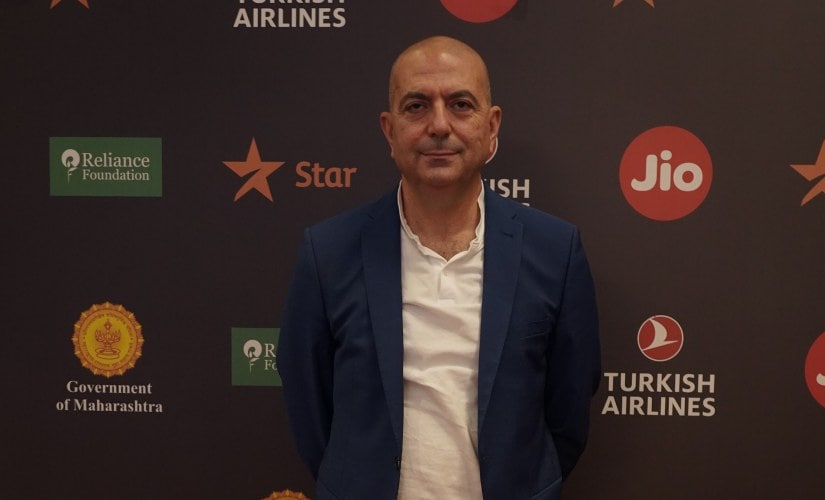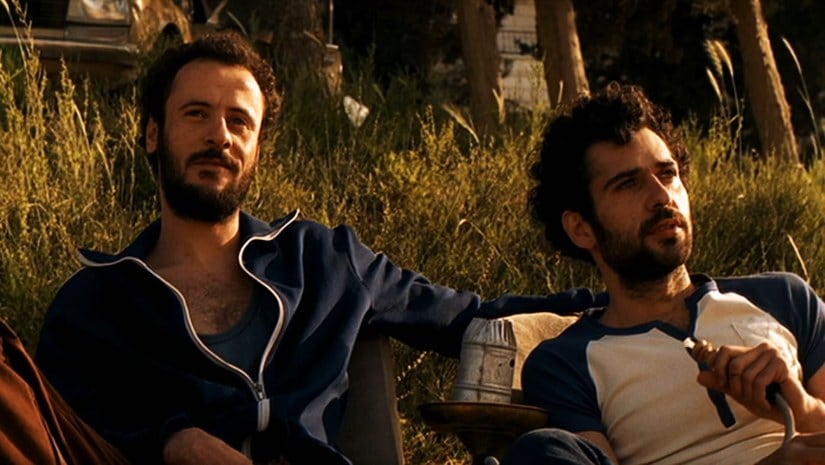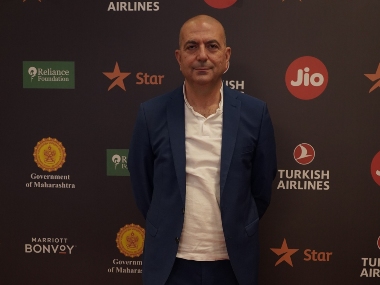Hany Abu-Assad likes to tell two versions of a story – that of how he became a film director. The more romantic one involves a neighbour he fell in love with, who did not reciprocate his feelings. She did, however, love movies, so Abu-Assad thought he could win her over by becoming a director. The other version is more cinematic: A five-year-old Palestinian boy in the 60s saw a moving picture for the first time in the cinema. In this era, going to the movies was almost ceremonial; one had to fight to get a seat. The boy was so enraptured by what was happening on the screen that he was convinced that the events taking place in the movie were real. He even raced out of the theatre, desperately looking for the horses that had run across the screen only a few minutes ago. “Watching One Flew Over the Cuckoo’s Nest at age 14 made me realise that movies could be more than entertainment. As a Palestinian living under occupation, I wondered about what I wanted to become. The forces were telling us that this was not our country… Fighting was one option, but through films I could resist without spilling blood,” he narrated at a masterclass at the 21st Jio MAMI Mumbai film festival, moderated by Nandita Das. Abu-Assad studied airplane engineering – a decision to assuage his parents, that made him quite unhappy – but finally turned to films. A chance meeting with director Rashid Masharawi and a stint as his personal assistant led to him finally making movies on his own. [caption id=“attachment_7528731” align=“alignnone” width=“825”]  Hany Abu-Assad. Image courtesy MAMI[/caption] For many cinephiles and students of film, Abu-Assad is their introduction to Palestinian cinema, especially because of his Golden Globe-winning film Paradise Now. He is also perhaps the most recognisable face from the region at film festivals; Rana’s Wedding took him to Cannes in 2002. But this is not something the director enjoys. “I became seen as the face of Palestine… It’s a pressure I didn’t like. I want to resist, but I don’t want to become the face of anything. This is why I’ve assumed the background lately, I don’t have Facebook or Twitter, I don’t promote myself. I don’t have a website. I just want to make movies in my own way,” he confesses in an interview to Firstpost. Abu-Assad very eloquently explained that given the current political scenario in Palestine, fraught as it is, the mere fact that he chooses to be a filmmaker is an act of resistance. “I am a reminder of Palestine’s existence. If the world erases all memories of Palestine, it wins. They want to make us forget who we are. But their cause is doomed to fail – even if one person continues to say they are Palestinian,” he asserts. But who is he making his Palestine-centric films for? I ask if he is making them for his people, or if he wants to be the country’s interpreter for the rest of the world. “First and foremost, my movies are for Palestinians. I believe that in most of Europe, most of the Middle East, and most of Africa, they’ve left their audiences to Walt Disney. India entertains its own audience, on the other hand. I want to make movies that my people can watch and be proud of, which they can love. But I can’t survive if I rely on only the audience of my own country, because the population is so small. You have to keep in mind the consideration that you have to be universal, not just for commercial reasons, but also artistic ones. If you want to make a story that touches people – even Palestinians – you have to speak about universal issues,” he explains. [caption id=“attachment_7528751” align=“alignnone” width=“825”]  A still from Paradise Now. Twitter/@harbisinema[/caption] Abu-Assad explains that in his movies, the politics is usually the backdrop against which the story is painted. Human relationships are, indeed, the driving force in his narratives, especially those of romantic love such as Omar, the winner of the Special Jury Prize in the Un Certain Regard section of the 2013 Cannes. “Love stories – but also betrayal. My wife Amira asked me why I’m so attracted to betrayal as a theme. I went back and realised that the biggest pain I felt in my life was when a dear friend betrayed me. I must have been 16, and I really loved this guy – I adored him. He was my idol. For the following six months, I would cry every day,” the director says, of why betrayal and love have shaped his filmmaking. On the subject of ‘art for art’s sake’, the director says that movies made solely for entertainment are not art. “If a filmmaker fancies themselves as being an artist, they will know that art for art’s sake is nonsense!” He explains that at two points in history, the notion was a protest: when painting was glorifying the Church in the 18th century, and when art was being used to sell products in modern times. “People forget that in its time, the concept was justified. The true mission of an artist is to nudge people to think by emotionally moving them. There must be a message, a thought underlying the art,” he says. To him, movies are a way to escape the identities imposed on us by politicians; he terms these identities as being ‘fake political identities’. “When politicians failed, they made you believe in false political identities in order to forget your real identity. These false identities breed inequality. For example, they ask you to focus on the fact that you are ‘Hindu’. When Left-wing politics failed, the Right won and began spreading the idea that divisive identities are more important,” he says. Alongside his films set in Palestine are his forays into Hollywood, memories that are of a bitter-sweet nature for the filmmaker. “Paradise Now was made in a post-9/11 world. I thought it would be distributed in Holland and France at the most. But it went to Berlinale, and there I heard that Warner Bros. wanted to buy the film for half a million dollars. I thought it was a trick! I was also dismissive of going to Hollywood, because I thought I would be betraying everything I stood for… Growing up in Europe, one does not hear much about Hollywood. When an agency called CAA called me, I shuddered! I assumed they were the CIA,” says Abu-Assad in an almost droll manner. He also admits to being in allure of the money that was on offer: $4,00,000 for being a script supervisor. “Soon you find yourself in a chic Hollywood hotel without anything to say,” he laments. But from this experience and the subsequent frustration came Omar, which was written after waking from a nightmare, in all of four hours. The conviction with which Abu-Assad speaks of his personal politics says much about his integrity. I ask if he has ever had to decline opportunities to work with people whose political opinions go against his own. “Yes. And it is a high price to pay, but I’m proud of the decision. It’s painful sometimes, but I don’t regret having made that decision,” he says. The director is not affected by the fact that he is known for making Paradise Now, which propelled him into fame and won him a Golden Globe. If anything, he is glad that it is his career-defining film, he doesn’t see it as a negative perception. “I don’t want to interfere with people’s process… just the same way as I’d consider any particular film to be the career-defining one for any other director,” he says. He also believes that film directors should not be immune to criticism. [caption id=“attachment_7528741” align=“alignnone” width=“825”]  A still from Omar. Twitter/@itsnotJesusXO[/caption] Abu-Assad made half a dozen documentaries around the time that he made his foray into feature films. He says that the fundamentals of fiction and non-fiction have seeped into each other in his process. “When I was exploring the fine line between documentary and fiction, I realised that in fiction, you are dictating reality. In a documentary, you allow reality to dictate you. Both are alike, because they have limitations: There can’t be 100 percent fiction, there is only so much you can achieve. And the moment you frame reality in a documentary, you are dictating. If there are moments when something real becomes fiction or fiction becomes real, you are making a great film,” he explains. For a question as abstract and subjective as ‘What makes a film good?’, Abu-Assad has a mathematical response. He is of the opinion that 80 percent of good filmmaking is about writing a good script; 15 percent is about choosing the right actors to elevate the characters beyond how you imagined them; five percent is about how you visualise the film. When an audience member asked how filmmakers can ensure that their art reaches film festivals, he says casually, “Don’t make a film ‘for festivals’. That is the producer’s task, it is not your job to sell your movie.”
Hany Abu-Assad doesn’t want to be Palestine’s interpreter for the world, he wants to make films that will make his people laugh and cry. In this conversation with Firstpost, he speaks about why he is attracted to love stories, his forays into Hollywood, and what makes a film good
Advertisement
End of Article


)
)
)
)
)
)
)
)
)



